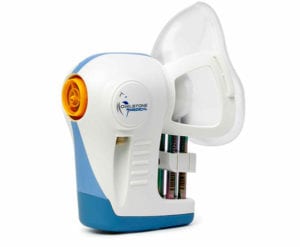A clinical trial has been launched to see if a breath test to see if it can detect the presence of cancer.

OWLSTONE MEDICAL LTD
Researchers want to find out if different types of different cancer types can be picked up in patterns of breath molecules. The Cancer Research UK team in Cambridge will collect breath samples from 1.500 people some with cancer. Of it proven to detect cancer it is hoped that the breath tests could be used in GP practices to decide if patients need to be referred for more tests.
The breath tests could potentially be used alongside blood and urine tests to help doctors detect cancer at an early stage. It will be two years before the results from the trial are known.
GPs’ leaders said the research was exciting, but they warned patients that breath tests to detect cancer were “unlikely to be commonplace at their GP practice anytime soon”.
The breath test works by molecules called volatile organic compounds (VOCs) are released when cells in the body carry out biochemical reactions as part of their behaviour. If cancer or any other conditions are present the behaviour of the cells is altered, and they appear to produce a different pattern of molecules and a signature smell.
The research team is trying to find out if this pattern or odour can be identified in people’s breath, using breath biopsy technology. The aim is to work out if different types of cancer produce different patterns which can be detected at an early stage.
This is just the start of the trial, so it may take several years to get the final answer and to know if it works or not. The science behind the test is not new. The trail will start with patients with suspected oesophageal and stomach cancers but then widened to include people with prostate, kidney, bladder, liver and pancreatic cancers. People who are seen as ‘healthy’ will also be included in the trial, the trial is to be held at Addenbrooke’s Hospital in Cambridge. Participants will be asked to breathe into a face mask for 10 minutes, so a sample can be collected; the samples collected are then taken to a lab for testing